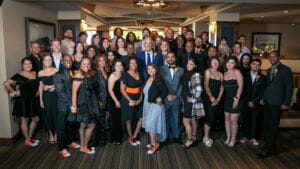In these tough economic times, nonprofit organizations are increasingly being relied upon for services, even as contributions continue to drop. Doing more with less has become the norm. In this lean environment, what happens if a nonprofit organization hits a legal road bump that could require hours of work from an attorney or law firm?
If they are lucky, nonprofit directors have planned for this contingency. In reality, however, legal issues sometimes catch nonprofit managers off guard, unprepared and lacking sufficient funds to cover legal expenses. And, finding an attorney or a law firm that provides pro bono legal work can be a challenge. Here are some steps nonprofits can take when seeking pro bono counsel.
Research is key
Ellis Carter, an attorney with Fennemore Craig, suggests doing research.
“The nonprofit should find out whether the firm has a policy regarding accepting pro bono work,” says Carter, whose practice focuses on advising nonprofits, charities and other tax-exempt organizations with respect to corporate, tax and regulatory issues.
Many times, larger firms have policies, liaisons or committees that screen pro bono projects, she adds. The screening ensures that the firm has the appropriate resources and expertise within its practice to provide the legal work required for the project.
“Be cautious about asking a lawyer or a firm to give pro bono advice in an area that they do not ordinarily practice in,” Carter says.
It might be rewarding for an attorney to give back to the community through pro bono assistance, but in complex matters facing nonprofit organizations, such as federal tax laws or state law constraints, it is important that the attorney providing assistance understands these laws, Carter notes.
Be prepared
While some firms have pro bono committees, other firms work through established programs such as the Volunteer Lawyers Program or other community organizations, says Rachel Lewis, marketing coordinator for Bryan Cave.
Demand for pro bono services has increased during this economic downturn, making it especially important for nonprofits to be prepared when seeking pro bono representation, Lewis adds.
“Bryan Cave has seen an even greater need for pro bono and has encouraged its lawyers to expand their commitment,” she says.
That means attorneys providing pro bono services will need to have a clear picture of what types of pro bono services organizations need and how best to allocate resources in order to meet those needs.
Carter recommends that if a nonprofit organization is planning to approach a law firm to request pro bono legal services, it should be prepared to provide articles of incorporation, bylaws, financial statements, the organization’s IRS determination letter, the organization’s most recently filed Form 990, and a compelling story regarding how pro bono services will help the organization impact the community.
“Obtaining pro bono counsel directly from a law firm to which the organization has no prior connection can be a challenge,” Carter says. “Frequently, law firms take on pro bono cases for nonprofits because one of the firm’s lawyers or clients has a connection to the organization.”
She suggests contacting community programs such as the Volunteer Lawyers Program as a first step toward finding pro bono legal assistance.
Volunteering is encouraged
Don’t be discouraged when seeking pro bono legal counsel. Law firms and even sole practitioners are committed to helping when they can. It is even encouraged.
“We have a special obligation to make our professional skills and other resources available to those who cannot afford to pay for legal services,” Lewis says.
Both Fennemore Craig and Bryan Cave encourage their attorneys to give back to the community through pro bono work.
In Arizona, philanthropic training starts in law school through service learning. The Sandra Day O’Connor College of Law at Arizona State University encourages students to help those who cannot afford legal services, says Kristine Reich, director of pro bono programs and student life at the law school. Reich coordinates more than two dozen pro bono programs and facilitates community outreach efforts.
Programs such the Advocacy Program Against Domestic Violence (APADV) and Wills for Heroes are just two of the pro bono efforts at the law school.
Students volunteering for APADV visit women in domestic violence shelters and, on an informal basis, answer any legal questions they may have, says Michelle Guina, a second-year law student at ASU and one of the program coordinators.
“The chance to have a legal education is such a privilege,” Guina says. “Pro bono opportunities in law school give you the chance to use what you’ve been given to give back to the community early in your legal career.”
www.fclaw.com | www.bryancave.com | www.law.asu.edu | www.vlpmaricopa.org



